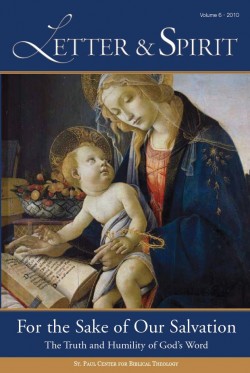
This is a big moment for us—for you and me and those who share in the work of the St. Paul Center. In a sense, it’s a moment we’ve been waiting for since the very day we launched this apostolate.
This month we mark the release of the sixth volume of our journal, Letter & Spirit. This issue took us much longer than any other, and at 432 pages it’s quite large. It is, without a doubt, the most historically significant publication we have produced.
Our theme is “For the Sake of Our Salvation The Truth and Humility of God’s Word.” And so we examine one of the most fundamental mysteries of the Christian faith, the mystery of the authority and inspiration of the sacred Scriptures as the Word of God.
It’s a big moment, and it’s a grand theme. Yet there’s something paradoxical about the matter. What we’re celebrating after all is the humility of the Word. The Son of God – infinite, eternal, and immortal — became flesh for our sake. The Word allowed himself to be “abbreviated,” as Pope Benedict recently put it. And then he took a further step, and he made himself known through simple, ordinary human words: he inspired the Scriptures. As the Word became flesh, fully human and fully divine, so he expressed himself in language that was truly human and yet fully endowed with divine power and truth.
We have been celebrating that fact since the day we opened our doors at the St. Paul Center – celebrating the Bible’s proper and exalted place in Christian life, Christian worship, Christian preaching, Christian prayer. Through our many programs—from free online Bible studies to special events and conferences—we’ve labored to promote biblical literacy for all Catholics and biblical fluency for clergy and teachers. And the Church has called us to do that in unexpected places: seminary classrooms, retreats for bishops and archbishops, pilgrimages to faraway lands, research in ivied halls … We’ve gone where we’ve been summoned.
When Pope Benedict called the bishops together, in 2008, for a synod on “The Word of God in the Life and Mission of the Church,” we saw it as a providential moment—a confirmation that the work we were doing was supremely important for the Church. Then, soon afterward, he “put it in writing” with his post-synodal apostolic exhortation, Verbum Domini. We heard him “exhorting” us to keep doing what we’re doing, only better.
I can’t imagine doing it better than we’ve done in Letter & Spirit, volume 6. Our contributors number among the most prestigious in the field: Dr. Germain Grisez of Mount St. Mary Seminary, Dr. Michael Waldstein of Ave Maria University, Dr. John Betz of Notre Dame University, and Dr. Matthew Levering of the University of Dayton. And, of course, there are voices that will be familiar to those who are close to our work: Dr. Brant Pitre, Fr. Pablo Gadenz, and Yours Truly. Voices from the past include Cardinal Augustin Bea and Fr. Romano Guardini — not to mention the great Fathers and Doctors of the Church, and many popes and councils.
When you see the testimony of so many witnesses, all gathered in one place, you’ll be struck by the consistency of the Church’s teaching down the ages. I know I was. What Pope Benedict proclaimed in Verbum Domini — about authority, inspiration, inerrancy — is what the Second Vatican Council proclaimed in the 1960s, and what St. Thomas Aquinas wrote in his Summa in the Middle Ages, and what the ancient Fathers preached in their ancient churches, and what we find in the New Testament itself!
I am so pleased that we could be ready with this journal, entirely devoted to those questions. I am so grateful to you for making it possible. Please join me in praying it will get into the hands of everyone who should see it. If you can, please make a generous donation to make it possible on a much larger scale.